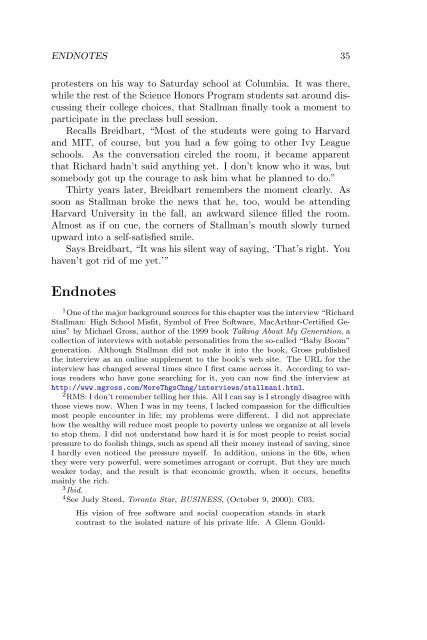Create successful ePaper yourself
Turn your PDF publications into a flip-book with our unique Google optimized e-Paper software.
ENDNOTES 35<br />
protesters on his way to Saturday school at Columbia. It was there,<br />
while the rest of the Science Honors Program students sat around discussing<br />
their college choices, that Stallman finally took a moment to<br />
participate in the preclass bull session.<br />
Recalls Breidbart, “Most of the students were going to Harvard<br />
and MIT, of course, but you had a few going to other Ivy League<br />
schools. As the conversation circled the room, it became apparent<br />
that Richard hadn’t said anything yet. I don’t know who it was, but<br />
somebody got up the courage to ask him what he planned to do.”<br />
Thirty years later, Breidbart remembers the moment clearly. As<br />
soon as Stallman broke the news that he, too, would be attending<br />
Harvard University in the fall, an awkward silence filled the room.<br />
Almost as if on cue, the corners of Stallman’s mouth slowly turned<br />
upward into a self-satisfied smile.<br />
Says Breidbart, “It was his silent way of saying, ‘That’s right. You<br />
haven’t got rid of me yet.’”<br />
Endnotes<br />
1 One of the major background sources for this chapter was the interview “Richard<br />
Stallman: High School Misfit, Symbol of Free Software, MacArthur-Certified Genius”<br />
by Michael Gross, author of the 1999 book Talking About My Generation, a<br />
collection of interviews with notable personalities from the so-called “Baby Boom”<br />
generation. Although Stallman did not make it into the book, Gross published<br />
the interview as an online supplement to the book’s web site. The URL for the<br />
interview has changed several times since I first came across it. According to various<br />
readers who have gone searching for it, you can now find the interview at<br />
http://www.mgross.com/MoreThgsChng/interviews/stallman1.html.<br />
2 RMS: I don’t remember telling her this. All I can say is I strongly disagree with<br />
those views now. When I was in my teens, I lacked compassion for the difficulties<br />
most people encounter in life; my problems were different. I did not appreciate<br />
how the wealthy will reduce most people to poverty unless we organize at all levels<br />
to stop them. I did not understand how hard it is for most people to resist social<br />
pressure to do foolish things, such as spend all their money instead of saving, since<br />
I hardly even noticed the pressure myself. In addition, unions in the 60s, when<br />
they were very powerful, were sometimes arrogant or corrupt. But they are much<br />
weaker today, and the result is that economic growth, when it occurs, benefits<br />
mainly the rich.<br />
3 Ibid.<br />
4 See Judy Steed, Toronto Star, BUSINESS, (October 9, 2000): C03.<br />
His vision of free software and social cooperation stands in stark<br />
contrast to the isolated nature of his private life. A Glenn Gould-


